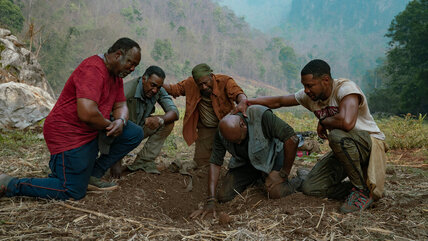C- | Vietnam vets return to their old warzone to unearth the remains of a comrade and a cache of gold. Directed by Spike Lee Starring Delroy Lindo, Clarke Peters, and Chadwick Boseman Review by Jon Kissel |

A combination heist and war movie, both genres that Lee has experience in, sounds like a lay-up for a director who is reliably entertaining, at minimum. One genre provides for the Bender-approved cool crime of burglary while the other allows for the heaviness that always sneaks into Lee’s work. The problem is that Lee can’t satisfy either expectation and the film collapses under the weight of its 154 minutes. The heist genre demands chemistry and Lindo’s overbearing presence makes that impossible. The film’s best shot, the four Bloods dancing through a Vietnamese club, is spent in the third or fourth scene, and while that shot gives off a lot of energy, it dissipates every time Paul threatens his supposed closest friends and there’s little to refill it. Their bond can’t just be daps. There’s an out here where the sane Bloods are too bonded to Paul that they can’t leave him, but he’s actively endangering their lives and the flashback war scenes are about everyone’s relation to Norman, not Paul in potentially saner times. If I can’t stand being around Paul and he’s always around the other characters, I don’t want anyone to succeed.
As a war film, Da 5 Bloods doesn’t do much better. A quick read through the Wikipedia page ‘Military History of African Americans in Vietnam War’ provides dozens of themes and stories more compelling than the one we get here. Of all directors, it’s out of character for Lee to skip dramatizing a discriminatory incident that would motivate the young Bloods to want to steal the gold they find. Instead, the Bloods relay historical racial injustices for the audience to soak up instead of something specific to their direct wartime experience. Lee contrives no scenarios that serve up the regular moral tangles within war zones, or that feel specific to Vietnam. What if a non-Blood soldier survived the battle where they find the gold? Would they have killed him to keep it in the family, especially within the context of fragging that regularly occurred during the Vietnam War? What if a Vietnamese civilian came upon them? Away from the gold itself, the death of Norman looms over the whole film and Boseman does an excellent job selling what was lost, as does Lindo in perpetual agony over being present at the death of his mentor. When we finally find out, it’s a complete anti-climax, where Norman was simply killed by a stealthy Viet Cong soldier while both his and Paul’s backs were turned. If Paul is going to be such a psychological mess so many years later, why not dramatically juice Norman’s death up?
The perfunctory nature of the death of such a larger-than-life character might be the point if another director made this film, but Spike Lee made it and he’s one of the least subtle directors working today. Let us use Da 5 Bloods as a window into what Lee was thinking about during the production of this film: Trump, MAGA, opioid abuse, border walls, the 1619 Project, school shootings, slave-owning founding fathers, and black maternal mortality. Directors generally don’t like to lard up their films with references and language specific to fads or current events, lest they become immediately dated. I feel like Da 5 Bloods is immediately dated and for no real payoff or reason. Lee seems to want his film to be an entry-level class into under-respected black achievers. Just make the movie about the first black Medal of Honor winner, or the Morehouse alum star hurdler. No other director would think to include flashes to still photos of them and others, because it turns one medium into another, namely a Powerpoint presentation. Lee’s desire to invoke What’s Happening Now actively breaks his movie. For instance, when tagalong David (Jonathan Majors), son of Paul, has a meet-cute with anti-land-mine activist Hedy (Melanie Thierry), it’s supposed to be endearing for both of them for future plot purposes. There’s a reason the scene ends after David brings up school shootings as the least fun part of his teacher job, because in the real world, there would be an interminable awkward silence and she would excuse herself. So much of Da 5 Bloods is the opposite of recognizable human behavior, often on the altar of a misplaced desire for relevance.

There’s just so much that irritates me in Da 5 Bloods. It’s both way too long for what’s present, but an epic length is easily imagined as justified if the film was better paced. Netflix-produced films seem to be incentivized towards longer runtimes, which makes sense for their business model but not necessarily for the creative vision of their content generators. I hate that some of that time is spent making characters into snooty European stereotypes. Reno’s Desroche might be the villain of the film, but I can’t countenance people talking ignorant shit about the French in WWII. In the case of the Finnish anti-land-mine activist, his arrogance towards David only serves to defang his death by land mine. The other death by land mine, Eddie, who coincidentally is played by the least famous actor, is the only scenario imaginable where his death scene might’ve been improved by talk about his romantic plans for his new wealth. That old cliché would’ve been less obvious than Eddie inorganically walking backwards. This is a shocking level of disrespect for the character, wherein Lee has him act like an alien and suffer a gory death. Whitlock’s Melvin dives on a grenade and we don’t see his guts and stubs. Norman dies of a PG-13 shot to the stomach. What purpose is served by the shot of a dismembered, bisected Eddie?
Lee’s talented enough that there’s always some redeeming quality in his films. Here, it’s Boseman playing a different kind of action hero, and one I’d return to COVID-infested theaters to see. Away from sainted historical figures and superheroes, which he’s not bad at by any means, the natural leader version of him in a larger role could be his best work thus far. I like Wire-alums Peters and Whitlock in everything they do. Lindo is generating the most buzz for this film, and he’s certainly the biggest. If he wins an Oscar sometime next spring or whenever the Oscars end up happening, it’ll be further validation to the idea that the Oscars don’t award the best acting, but the most. Da 5 Bloods is broken in a lot of ways, and Lindo does his part by being so actorly and over-the-top.
I’ve got a Big Picture podcast queued up for next week about Da 5 Bloods, and the subtitle is something like how this is the movie of the moment. First, it’s an accident of history and release schedules that this film came out when it did in the environment that it did. Second, I would hope the moment ends up being smarter than this film. Spike Lee knows and has demonstrated that movies become great through the relationship of specificity and universality. Da 5 Bloods goes for some universal point about how poorly the US has treated its black citizens in a milieu where everyone was being treated poorly, and then fails to hammer that point home through the creation of specific, grounded characters. If anything, this is a movie for a moment before the most recent uprisings, where a greater percentage of people could pretend that they were oblivious. Right now, Da 5 Bloods feels as out of date as it will be in the near future. C-
 RSS Feed
RSS Feed